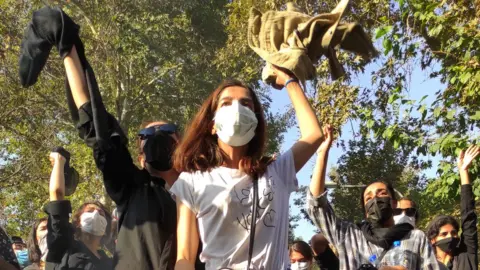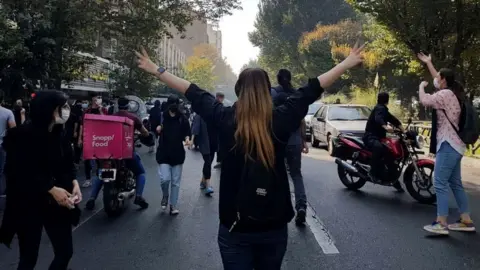Iran protests: 'The people will fight until they succeed'
 Getty Images
Getty ImagesWomen are right at the heart of Iran's fresh wave of protests. The death of 22-year-old Mahsa Amini in police custody in Tehran has energised a fresh generation to demand new rights and freedoms. But many Iranians say speaking out against the regime brings real risks.
Here, three women from western Iran share their personal insights into the biggest demonstrations to grip the country for years. We've changed their names for their protection.

Nil, 24, from Bukan
"I've been taking part in the protests, and I've seen them close-up. It was my first experience of witnessing such things, and I was shocked.
The police started shooting people even before they got the chance to chant slogans. They used shotguns, but I think they also used live ammunition because it had a very loud sound.
I saw it with my own eyes, they attacked people with batons. It was so close it could hit me too. But we escaped.
Daily life is not like it used to be. Shops are now closed from the early evening, when in the past they were open during the night. There are fewer cars in the street, but in the past there were crowds until midnight.
Now people's cars and even houses are attacked very easily.
I am sure we will succeed. People were really brave, despite the fact that the regime is so ruthless. I'm sure they can't suppress people forever.
I only want to say that the police were ruthless. They attacked even the elderly in front of my eyes. They attacked women. They especially hit them in the head. They attack women even more.
But one thing which is so important is that I took off my hijab, walking right in front of the police's eyes.
I saw other women doing the same, but the police couldn't say anything. This is a sign we are winning."

Rojano, 45, a women's rights activist and writer from Sanandaj
"On the first day of the protests, as people began to gather, 90% of participants and those who started chanting slogans were women. In the beginning, the security forces were targeting and attacking and oppressing the men who joined the women in their protests.
The slogans began with "woman, life, freedom". The place was full of women, brave and angry women who were subjected to pain, but they weren't afraid of the baton or the forces' calls for them to go home.
They came to stand against all the discrimination that women are facing. I saw people's bravery and their determination for their cause. I saw the fear in the security forces' eyes.
Women didn't want to give up on their fight for equality. They still don't.
 EPA
EPAThe number of special forces located in different parts of the city is really large, but people are still continuing with their daily lives and doing whatever they need to do.
On days when there is a public strike all the shops are closed, but people still get out to walk.
It seems like they want to show the regime that they are not afraid of them, and that they will not leave the streets and give up on their protests.
One thing which surprises me is that people seem almost carefree in responding to the presence of the security forces. They easily pass through them during the day and in the evening they start again with their protests, making bonfires and chanting slogans."

Zilan, 52, from Bukan
"I have seen real resistance, especially from the teenagers and youths who are attending these protests. This generation is brave and without fear. They know they might end up in prison, they know they might be arrested, tortured and even get killed, yet they insist on participating in this revolution.
One important aspect of these protests that sparked with the death of Zhina [Mahsa Amini's Kurdish given name] is the big role women are playing. They are attending the demonstrations side by side with their fellow men.
Anti-riot forces are using every means to suppress the peaceful protesters, who are just asking for their basic rights. They used guns to crack down on them, and people around the world have seen that in the videos shared online. I've been following it all so closely.
We don't have a normal life here anymore. On the one hand, these events are giving people hope that the end of this regime could be close. But on the other hand, what's happening is badly affecting people's mental health. I've heard from so many people saying that they would never be the same.
Another positive point is sympathy for people you don't know, and the new union which has now formed between different ethnicities. That is because the number of protesters has grown, and more cities and towns have joined the demonstrations.
Unlike previous protests, this time people don't want to sit back, and they've decided to fight until they reach their goals. Unlike in the past, this time the regime could not terrify them with the threat of prison, torture, and killing.
As the regime's crimes are increasing, people's anger is increasing, too."

What do you want to know about Iran and the protests there? The BBC's chief international correspondent Lyse Doucet and BBC Persian reporters will answer your questions on Friday in special live coverage on the BBC website.
You can send questions you'd like to put to them in the following ways:
- Email [email protected]
- WhatsApp: +44 7756 165803
- Tweet: @BBC_HaveYourSay
In some cases your question will be published, displaying your name, age and location as you provide it, unless you state otherwise. Your contact details will never be published. Please ensure you have read our terms & conditions and privacy policy.
You can also use this form to ask your question:
If you are reading this page and can't see the form you will need to visit the mobile version of the BBC website to submit your question or send them via email to [email protected]. Please include your name, age and location with any question you send in.

